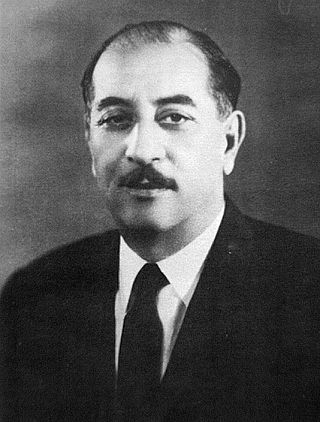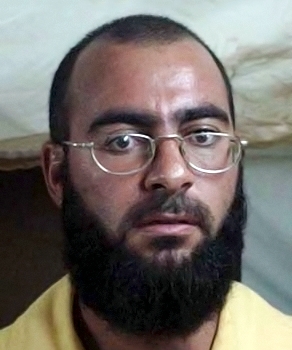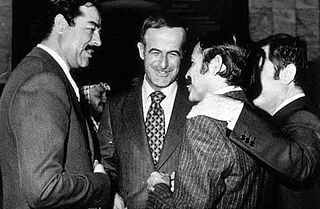Related Research Articles

Ahmed Hassan al-Bakr was an Iraqi politician who served as the fourth president of Iraq, from 17 July 1968 to 16 July 1979. He was a leading member of the revolutionary Arab Socialist Ba'ath Party and later the Baghdad-based Ba'ath Party and its regional organisation Ba'ath Party – Iraq Region, which espoused Ba'athism, a mix of Arab nationalism and Arab socialism.
The Iraqi Revolutionary Command Council was established after the military coup in 1968, and was the ultimate decision-making body in Iraq before the American-led invasion in 2003. It exercised both executive and legislative authority in the country, with the Chairman and Vice Chairman chosen by a two-thirds majority of the council. The Chairman was also then declared the President of Iraq and he was then allowed to select a Vice President. After Saddam Hussein became President of Iraq in 1979 the council was led by deputy chairman Izzat Ibrahim ad-Douri, deputy Prime Minister Tariq Aziz, and Taha Yassin Ramadan, who had known Saddam since the 1960s.

Hardan 'Abdul Ghaffar al-Tikriti was a senior Iraqi Air Force commander, Iraqi politician and ambassador who was assassinated on the orders of Saddam Hussein. Additionally he held the titles of vice chairman of the Iraqi Revolutionary Command Council and vice president of Iraq.
Operation Morvarid was an operation launched by the Iranian Navy and Air Force against the Iraqi Navy sites on 27 November 1980 in response to Iraq positioning radar and monitoring equipment on the Mina Al-Bakr and Khor-al-Amaya oil rigs to counter Iranian air operations. The operation resulted in a victory for Iran, which managed to destroy both oil rigs as well as much of the Iraqi Navy and inflicted significant damage to Iraqi ports and airfields.
Khalid ibn al-Walid ibn al-Mughira al-Makhzumi was a 7th-century Arab military commander. He initially headed campaigns against Muhammad on behalf of the Quraysh. He later became a Muslim and spent the remainder of his career in service to Muhammad and the first two Rashidun caliphs: Abu Bakr and Umar. Khalid played the leading command roles in the Ridda Wars against rebel tribes in Arabia in 632–633, the initial campaigns in Sasanian Iraq in 633–634, and the conquest of Byzantine Syria in 634–638.

Ba'athist Iraq, officially the Iraqi Republic (1968–1992) and later the Republic of Iraq (1992–2003), was the Iraqi state between 1968 and 2003 under the rule of the Arab Socialist Ba'ath Party. This period began with high economic growth, but ended with the country facing severe levels of socio-political isolation and economic stagnation. By the late 1990s, the average annual income had decreased drastically due to a combination of external and internal factors. UNSC sanctions against Iraq, in particular, were widely criticized for negatively impacting the country's quality of life, prompting the establishment of the Oil-for-Food Programme. The Ba'athist period formally came to an end with the 2003 invasion of Iraq, and the Ba'ath Party has since been indefinitely banned across the country.
The 4th Gulf Cup was the fourth edition of the Gulf Cup. The tournament was held in Doha, Qatar and was won by three-time defending champions Kuwait. The tournament took place between 26 March and 15 April 1976. All matches were played at the Khalifa Sports City Stadium.

Ibrahim Awad Ibrahim al-Badri, commonly known as Abu Bakr al-Baghdadi, was an Iraqi militant who was the first caliph of the Islamic State from 2014 until his death.

The November 1963 Iraqi coup d'état took place between November 13 and November 18, 1963, when, following internal party divisions, pro-Nasserist Iraqi officers led a military coup within the Ba'ath Party. Although the coup itself was bloodless, 250 people were killed in related actions.

The 17 July Revolution was a bloodless coup in Iraq in 1968 led by Ahmed Hassan al-Bakr, Abd ar-Razzaq an-Naif, and Abd ar-Rahman al-Dawud that ousted President Abdul Rahman Arif and Prime Minister Tahir Yahya and brought the Iraqi Regional Branch of the Arab Socialist Ba'ath Party to power. Ba'athists involved in the coup as well as the subsequent purge of the moderate faction led by Naif included Hardan al-Tikriti, Salih Mahdi Ammash, and Saddam Hussein, the future President of Iraq. The coup was primarily directed against Yahya, an outspoken Nasserist who exploited the political crisis created by the June 1967 Six-Day War to push Arif's moderate government to nationalize the Western-owned Iraq Petroleum Company (IPC) in order to use Iraq's "oil as a weapon in the battle against Israel." Full nationalization of the IPC did not occur until 1972, under the Ba'athist administration. In the aftermath of the coup, the new Iraqi government consolidated power by denouncing alleged American and Israeli machinations, publicly executing 14 people including 9 Iraqi Jews on fabricated espionage charges amidst a broader purge, and working to expand Iraq's traditionally close relations with the Soviet Union.

The Islamic State of Iraq, previously referred to as al-Qaeda in Iraq, is a militant Salafist jihadist group that aimed to establish an Islamic state in Sunni, Arab-majority areas of Iraq during the Iraq War and later in Syria during the Syrian Civil War.

The Banu Shayban is an Arab tribe, a branch of the Bakr ibn Wa'il group. Throughout the early Islamic era, the tribe was settled chiefly in the Jazira, and played an important role in its history.
Samir Abd Muhammad al-Khlifawi, better known by the pseudonym Haji Bakr and sometimes his kunyaAbu Bakr al-Iraqi, was a senior leader of the militant group Islamic State of Iraq and the Levant (ISIL), heading its Military Council and leading its operations in Syria, prior to his killing by Syrian rebels in January 2014. Previously a Colonel in the Iraqi Intelligence Service, papers found after his death indicated that al-Khlifawi played a key role in devising the plans ISIL used to conquer and administer territory in Syria and Iraq.

Adnan Latif Hamid al-Suwaydawi al-Dulaymi, also known by his noms de guerre Abu Muhannad al-Suwaydawi, Abu Abdul Salem, and Haji Dawūd was a top commander in the Islamic State of Iraq and the Levant (ISIL) and the former head of its Military Council.
The Iraqi Intifada was a series of national strikes and violent protests against the ruling Hashemite monarchy and the Anglo-Iraqi Treaty. Inspired by the Egyptian Revolution and Iranian Prime Minister Mohammad Mosaddegh's nationalization of oil, the revolutionaries wanted to force Faisal II's abdication, transform the state into a republic, and assert Iraq's full independence from Britain by assuming control over its own foreign affairs.

The 1979 Ba'ath Party Purge or Comrades Massacre was a public purge of the Iraqi Ba'ath Party orchestrated on 22 July 1979 by then-president Saddam Hussein six days after his arrival to the presidency of the Iraqi Republic on 16 July 1979.
Abdul Nasser Qardash is an Iraqi militant who in 2019 was wrongly reported as the leader of the Islamic State of Iraq and the Levant (ISIL). He was also nicknamed "The Professor" and "Destroyer". Qardash was a high-ranking and very influential member of ISIL with close connections to its first Caliph, Abu Bakr al-Baghdadi, and tipped as a potential candidate for ISIL leadership succession. However days after the death of al-Baghdadi, Abu Ibrahim al-Hashimi al-Qurashi was ultimately chosen as the new declared leader of ISIL. Qardash was captured by Iraqi security forces in 2020.

Abu Ibrahim al-Hashimi al-Qurashi was an Iraqi militant and the second caliph of the Islamic State. His appointment by a shura council was announced by the Islamic State media on 31 October 2019, less than a week after the death of previous leader Abu Bakr al-Baghdadi.

Saad Sport Club is an Iraqi football team based in Ad-Dawr, Saladin, that plays in Iraq Division Three.
References
- ↑ "Iraq – Record International Players". niiiis.com.
- ↑ حسن مولى: المدرسة التخصصية في البصرة تنتظر الرعاية والدعم (in Arabic). almadapaper.net. 25 February 2013.